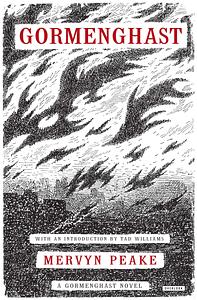You need to sign in or sign up before continuing.
Take a photo of a barcode or cover
It's taken me a long time to get through this, the second volume of Mervyn Peake's Gormenghast trilogy. It's not because this is a particularly dull book - though the prose style that he uses often means that the plot is slow to unravel, and the writing is often dense and compacted - but because I made myself read it in chunks of fifty pages at a time so that I could savour it for longer.
I'm always at a loss as to how exactly he did it, but even with a style as Gothic as his was, Peake always managed to stay above the level of writing purple prose. Instead, he created a kind of writing that is beautiful and morbid and dark and funny and enjoyable and and extravagant and fantastic all at once.
The characters that he sketches are gorgeous things of murk and shadows and madness - Lady Gertrude, Titus, Fuschia, and above all, Steerpike - who inhabit a world which is seemingly so different from our own, but which always seems to share our modern preoccupations with delineations and values and the past, and always, always, the desire for freedom. It's often blackly funny in its observations on human behaviour, and wryly cynical to boot. Think of Terry Pratchett, and then skew the Discworld books to a place darker and weirder than anything Pterry ever conceived, and that is where the Gormenghast books dwell.
This is a large book in and of itself - over 500 pages in my paperback edition - and the trilogy itself sprawls to encompass many hundreds of pages more. But it's still a hugely rewarding work to read, and I can't recommend it highly enough.
There should be no rich, no poor, no strong, no weak,' said Steerpike, methodically pulling the legs off the stag beetle, one by one as he spoke. 'Equality is the great thing, equality is everything.'
I'm always at a loss as to how exactly he did it, but even with a style as Gothic as his was, Peake always managed to stay above the level of writing purple prose. Instead, he created a kind of writing that is beautiful and morbid and dark and funny and enjoyable and and extravagant and fantastic all at once.
The characters that he sketches are gorgeous things of murk and shadows and madness - Lady Gertrude, Titus, Fuschia, and above all, Steerpike - who inhabit a world which is seemingly so different from our own, but which always seems to share our modern preoccupations with delineations and values and the past, and always, always, the desire for freedom. It's often blackly funny in its observations on human behaviour, and wryly cynical to boot. Think of Terry Pratchett, and then skew the Discworld books to a place darker and weirder than anything Pterry ever conceived, and that is where the Gormenghast books dwell.
This is a large book in and of itself - over 500 pages in my paperback edition - and the trilogy itself sprawls to encompass many hundreds of pages more. But it's still a hugely rewarding work to read, and I can't recommend it highly enough.
There should be no rich, no poor, no strong, no weak,' said Steerpike, methodically pulling the legs off the stag beetle, one by one as he spoke. 'Equality is the great thing, equality is everything.'
adventurous
dark
mysterious
tense
slow-paced
Plot or Character Driven:
A mix
Strong character development:
Yes
Loveable characters:
Yes
Diverse cast of characters:
Yes
Flaws of characters a main focus:
Yes
This book is quirky, labyrinthian, humorous, and dark. It's a great followup to the first book that makes you want to read the third.
mysterious
tense
slow-paced
Plot or Character Driven:
Character
Strong character development:
Complicated
Loveable characters:
No
Diverse cast of characters:
No
Flaws of characters a main focus:
Yes
adventurous
emotional
tense
slow-paced
Plot or Character Driven:
Character
Strong character development:
Yes
Loveable characters:
No
Diverse cast of characters:
Yes
Flaws of characters a main focus:
Yes
dark
emotional
tense
slow-paced
Plot or Character Driven:
A mix
Strong character development:
Yes
Loveable characters:
Complicated
Diverse cast of characters:
No
Flaws of characters a main focus:
Yes
Content warnings: violence against animals (a monkey), arson, suicidal ideation, depression, grief, suicide, parental abuse, death by immolation and drowning, blood, PTSD, death of a newborn (mentioned), scarring, starving to death
In this second entry into the Gormenghast trilogy, the castle is functionally without a lord, as its current should-be lord is a child name Titus and the master of ceremonies is training the anti-hero Steerpike, who still has grand ambitions to take over. Much like Titus Groan, it is slow going for the first half of it. Peake lays out his thesis of “ritual for ritual’s sake made at the expense of human performers is not worth upholding” with meticulous detail. Few stones get unturned in the depiction, and all the drama and plot lie with the characters at its center. The characterization goes as hard as the physical descriptions and the easy-to-understand-but-require-intense-parsing-long-ass sentences.
One of the things I didn’t expect is just how the concept of unwanted legacy infiltrates the overall mood. Conceptually, as it interrogates longevity and undeath, it’s very gothic. This theme, however, also doesn’t become salient until about halfway through the book, when Titus interacts with the exiled Mr. Flay from the previous book. This is a fantasy of manners, so a lot of the plot beats match the pace and tension of the character interactions. Whenever Titus talks to his family, there’s a sense of constructed distance that’s not aided at all by the monstrous architecture they inhabit. There’s a lot of emotional neglect for both Titus and Fuchsia, the latter of which I will speak on a bit more later, despite how much page time individuals spend together. There’s a marriage of something like convenience that at first, amused, but becomes so sad put into the context of the dreary loneliness permeating all of Castle Gormenghast, despite how occupied and seemingly inhabited it is.
Continuing on that thread, the aspect that I enjoyed the most and made me absolutely feral is the exploration of depression and isolation, both literal and psychological. It’s most salient in the tragedy of Fuchsia Groan. There is so much distance between Fuchsia and everyone she considers beloved, made even more permanent with several major character deaths and betrayals. It’s heart-wrenching, and Peake does not relent on the density of his prose when it comes to the void that is her interior state. It’s beautiful and hypnotic, and deftly captures what that despair can be like, made even more intense when those who remain around her point it out as well.
There are literal acts of God that cause some people’s demise, and honestly, Peake makes it work. There’s so much scheming that sometimes the avalanche needs a small tremor in order to really get rolling. The moments when nature wreaks as much havoc as human hubris coincide beautifully when they do. There are thunderstorms that are earth-shattering in several ways, and it’s clear Peake enjoyed bringing those moments together. There’s a reverence for nature and character in a way that I haven’t seen in quite some time.
Once again, the things people love in dark fantasy of the court intrigue gothic variety, are full on display here, complete with natural disasters that feel more like ticking time bombs for the secrets bubbling beneath the surface rather than deus ex machinas.
I thought the first book was a masterpiece, so I'm out of adjectives for this one beyond "it's brilliant."
Glibness aside, what makes Peake stand out is here again: prose builds the castle brick by brick, in sunlight and mist and flood; he breathes life into characters (really, that ending had no business being as impactful as it was).
This book is not light reading—its humor is dark, its conclusions are somewhat grim, and its villain is outright despicable. I love it anyway, for thoughtful analysis of tradition and tyranny, and for what a motivating force love of hearth and home can become.
Glibness aside, what makes Peake stand out is here again: prose builds the castle brick by brick, in sunlight and mist and flood; he breathes life into characters (really, that ending had no business being as impactful as it was).
This book is not light reading—its humor is dark, its conclusions are somewhat grim, and its villain is outright despicable. I love it anyway, for thoughtful analysis of tradition and tyranny, and for what a motivating force love of hearth and home can become.
Despite the length of this book, it didn't seem as hard to read as the first.Yes, it still had tortuously long sentences and words that were not in the Kindle dictionary. It also required several readings of some passages to get the general idea.
This time, however, the main characters were known (and, SPOILER, killed off! )
It appears to be several books in one, again. First we have Titus at school, and a blossoming romance as a side line.
We have the reappearance of an old character, followed by the rapid demise of two others.
Then we get the natural disaster that unfolds.
A few more deaths and Titus becomes a rebel in the eyes of Gormenghast.
A good read, but I need something light before finishing the series.
This time, however, the main characters were known (and, SPOILER, killed off! )
It appears to be several books in one, again. First we have Titus at school, and a blossoming romance as a side line.
We have the reappearance of an old character, followed by the rapid demise of two others.
Then we get the natural disaster that unfolds.
A few more deaths and Titus becomes a rebel in the eyes of Gormenghast.
A good read, but I need something light before finishing the series.
adventurous
dark
mysterious
reflective
sad
tense
slow-paced
Plot or Character Driven:
A mix
Strong character development:
Yes
Loveable characters:
Yes
Diverse cast of characters:
Complicated
Flaws of characters a main focus:
Complicated
adventurous
challenging
dark
emotional
funny
hopeful
informative
inspiring
lighthearted
mysterious
reflective
relaxing
sad
tense
slow-paced
peake fiction





